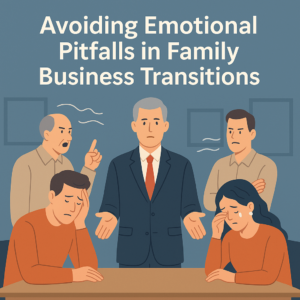Avoiding Emotional Pitfalls in Family Business Transitions
Navigating the Human Side of Family Business Succession
When succession involves family, emotions can make or break the outcome. Here’s how to move forward with clarity, trust, and confidence.
Family business transitions are never just business. They’re personal, emotional, and if not handled carefully can lead to conflict, fractured relationships, and lost value. While most succession planning focuses on tax efficiency or legal structure, it’s often the emotional dynamics that present the greatest risk.
Why Emotions Derail Succession Plans
Transitions in family-owned businesses are often triggered by major life events such as retirement, illness, or the passing of a founder. These moments carry emotional weight. When layered on top of long-standing family roles, sibling rivalries, perceived favoritism, or unclear expectations, they create the perfect conditions for misunderstanding or conflict.
Sometimes, succession planning stalls because no one wants to hurt a family member’s feelings. Other times, the outgoing generation hesitates to fully let go, fearing the business won’t survive or that their identity will disappear. In many families, these unspoken tensions cause decision-making to slow down or stop altogether.
The consequences can be severe: delayed transitions, fractured relationships, or even businesses being sold or shut down because trust broke down at the worst possible time.

Real-World Example: A Transition Almost Lost
In my first business, co-founded with my brother, I faced a tough decision. I felt that if I didn’t return to college, after taking a year off, I never would. However, the business was gaining traction. My decision to go back to college could have easily sparked conflict or resentment. Instead, we committed to open communication. I juggled school and business, staying as engaged with the business as I could from half way across the country.
That effort paid off. I found an opportunity for our business in Colorado at the Boulder Technology Incubator. What could have been a crisis became a milestone. We kept the lines of communication open and my brother moved out to Colorado so we could work on the business together.
This experience taught me that emotional moments don’t have to derail progress. When trust is maintained and dialogue is prioritized, transitions can become opportunities for deeper alignment and growth.
The Role of Facilitation and Mediation
Most families already have accountants and estate attorneys helping with succession. What’s often missing is a neutral business advisor focused on preserving trust and clarity when emotions rise.
Facilitation helps families have structured, respectful conversations before tensions turn into long-term conflict. It gives every voice a seat at the table…especially important when not everyone has the same influence or decision-making power.
If things escalate or become polarized, mediation or a neutral business advisor can help re-establish common ground and protect the business from becoming collateral damage in a personal dispute.
I sometimes think of it as being a “business therapist.” Not someone who resolves personal history, but someone focused on the health and longevity of the business while understanding the relationships that surround it.
Practical Steps to Reduce Emotional Risk
Here are some actionable ways to keep emotions from undermining the business:
- Hold regular meetings: Don’t wait for things to boil over. Scheduled discussions can reduce anxiety and build trust.
- Establish ground rules: Agree on how decisions are made and how conversations will be handled. This helps create safety and predictability.
- Bring in a neutral facilitator early: Ideally, before conflict surfaces. Early support can help families explore sensitive topics without judgment and find a way to work through difficult discussions.
- Be honest about readiness: Is the next generation prepared to take over? If not, a mentor or interim leader can help bridge the gap.
- Keep family and business separate: Avoid letting every meal become a board meeting—or vice versa. Respect personal time and business. Nothing ruins an outing like discussing difficult business issues when you are on a golf course or out to celebrate a birthday.
Why It Matters
According to PWC’s Global Family Business Survey, nearly two-thirds of family-owned businesses lack a documented succession plan, even though 72% of owners want the business to stay in the family. More shocking is that only 22% of U.S. businesses and 19% globally have conflict resolution mechanisms in place. Without a plan—or a process for navigating the emotional side of succession—families risk losing not just their business, but their legacy.
A thoughtful, emotionally intelligent transition isn’t just good for relationships. It’s good for business continuity, valuation, and long-term success.
Closing Thought
Emotions are inevitable. Mismanaging them doesn’t have to be.
With the right guidance, family businesses can turn emotionally charged transitions into opportunities for greater alignment, trust, and long-term prosperity.
Need a trusted advisor to help navigate your family business transition?
Let’s talk about how Prosperity Advising can protect your business—and your relationships. Schedule an appointment today!
#FamilyBusiness #SuccessionPlanning #BusinessMediation
#ConflictResolution #BusinessContinuity #FamilyBusinessAdvisor
#EmotionalIntelligence #LeadershipDevelopment #BusinessTransitions






